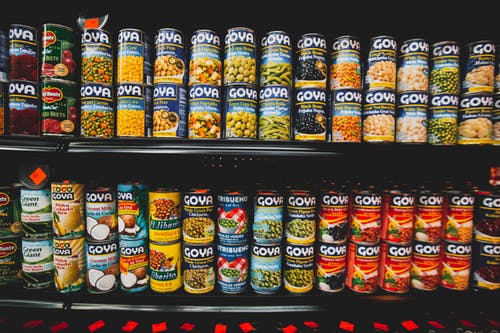By Vanessa Evens A Recent ASU Nutrition Student
It’s no secret that canned produce has a little bit of a bad reputation, but is that reputation based in fact or fiction? We’ve all heard that cooking vegetables takes out some of their nutritional value so canning them must have some effect right? Research is saying not necessarily.

Canned vegetables are not only convenient, but they are very cost-efficient as well. We’ve been told for years that canned vegetables are not as high in nutrients as frozen or fresh produce but research is suggesting that is not the case. The key is for the canned goods to not have added sugars or salts. If canned foods are free from these two things then they are just as nutritious as their fresh counterparts.
How can this be true? Well, the answer is relatively simple. Fresh produce loses some of its nutritional value during shipping and storing, and canned vegetables lose some of their nutrients (particularly water-soluble nutrients like vitamins B and C) in the canning process. The key component here is that the canned vegetables aren’t exposed to a lot of oxygen, which is what makes our fresh produce go bad. The more time that fresh produce is exposed to oxygen, the more it loses its nutritional value.
This same thing goes for canned fruits. Just make sure they are free from added sugars. This is great news for our kids’ packed lunches as well as our pantries. Stocking up on canned vegetables is convenient, and quick. They make an easy addition to any meal to up your produce consumption.
This also means that all of your fresh produce you buy but can’t consume in time, or the produce you grow from your very own garden can be canned by you at home and maintain its nutritional value for a later date.
Now that you know canned foods are just as healthy, here are some things to look out for while you are perusing the canned vegetable aisle. The first thing as we mentioned before is no added salts or sugars. Next, you want to make sure you are looking for cans that are free from BPA, which is argued to have multiple negative health effects.
Branch out and try some things from the canned foods aisle that you’ve maybe not tried before. In addition to your regular veggies, beans, and fruit, try canned fish, canned pumpkin or sweet potatoes in your baked goods. Try making your own marinara sauce with canned tomatoes, or just try a new vegetable like artichokes.
With this good news about the good nutritional value of canned produce, it is even easier to make a nutritious meal for your family every night without breaking the bank or taking all night!
References:
Are Canned Foods Nutritious for My Family? (n.d.). Retrieved from https://www.eatright.org/food/vitamins-and-supplements/nutrient-rich-foods/are-canned-foods-nutritious-for-my-family
Canned foods nutritionists swear by. (n.d.). Retrieved from https://www.nbcnews.com/better/pop-culture/canned-foods-nutritionists-swear-ncna920811
O’Connor, A. (2013, May 27). Really? The Claim: Fresh Produce Has More Nutrients Than Canned. Retrieved from https://well.blogs.nytimes.com/2013/05/27/really-the-claim-fresh-produce-has-more-nutrients-than-canned/
Looking for more articles to help boost your healthy living? Check out our Fill Your Plate Blog. Looking for some recipes that the whole family will enjoy? Check out the recipe section on our website.

